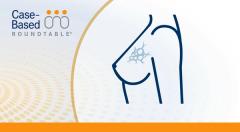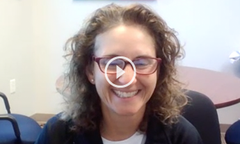
Type of Breast Cancer in TROPION-PanTumor01 Affects Level of Benefit
Erika P. Hamilton, MD, discusses the patient population with breast cancer enrolled in the TROPION-PanTumor01 trial in relation to the efficacy of datopotamab deruxtecan.
Episodes in this series

Erika P. Hamilton, MD, director of breast cancer and gynecologic cancer research at the Sarah Cannon Research Institute, discusses the patient population with breast cancer enrolled in the TROPION-PanTumor01 trial (NCT03401385) in relation to the efficacy of datopotamab deruxtecan (Dato-DXd).
There were patients with hormone receptor (HR)-positive and triple-negative breast cancer (TNBC) taking part in this phase 1 trial for Dato-DXd. Those with HR-positive disease could not have prior treatment with trastuzumab deruxtecan (Enhertu; T-DXd) or sacituzumab govitecan (Trodelvy) whereas those with TNBC could have received those antibody-drug conjugates (ADCs).
This trial evaluated objective response rate (ORR), disease control rate (DCR), and progression-free survival (PFS) in these patients. According to Hamilton, the 15 patients with TNBC who had not received a topoisomerase ADC had a longer PFS compared with those who did. Dato-DXd is also being investigated in other trials for different subsets of patients with breast cancer alone or as a combination therapy.
TRANSCRIPTION:
0:10 | I think it's important to describe who the patients were that enrolled here. So all of the patients with HR-positive breast cancer had to be naive to a [topoisomerase] ADC, meaning they can't have had prior T-DXd or prior sacituzumab. Among the patients with TNBC, they were allowed to have prior [topoisomerase] ADC. Of those 44 patients, 15 did, so we have a little bit of a different population in here.
0:36 | We saw that the ORR in this phase 1 [trial for patients with HR-positive disease]—a pretty heavily pretreated population [with a] median number of 6 lines of therapy—was 26.8%. The DCR was 85% and the [median] PFS was 8.3 months. Now on the triple-negative side, [they were] a little bit less pretreated, but still quite heavily pretreated for TNBC: a median of 4 prior [therapies], the ORR was actually even a little bit higher, 31.8%, DCR of 80%, and the [median] PFS was 4.4 months.
1:09 | If we separate out those patients [who] had already seen a [topoisomerase] ADC of the triple-negative subset, so those that were [topoisomerase] naive, we actually saw the PFS was even longer: 7.3 months. I think [we had] very encouraging data in terms of efficacy, particularly from a phase 1 standpoint. This drug is in a lot of other clinical trials [including] randomized later-line trials to see about its place.












































